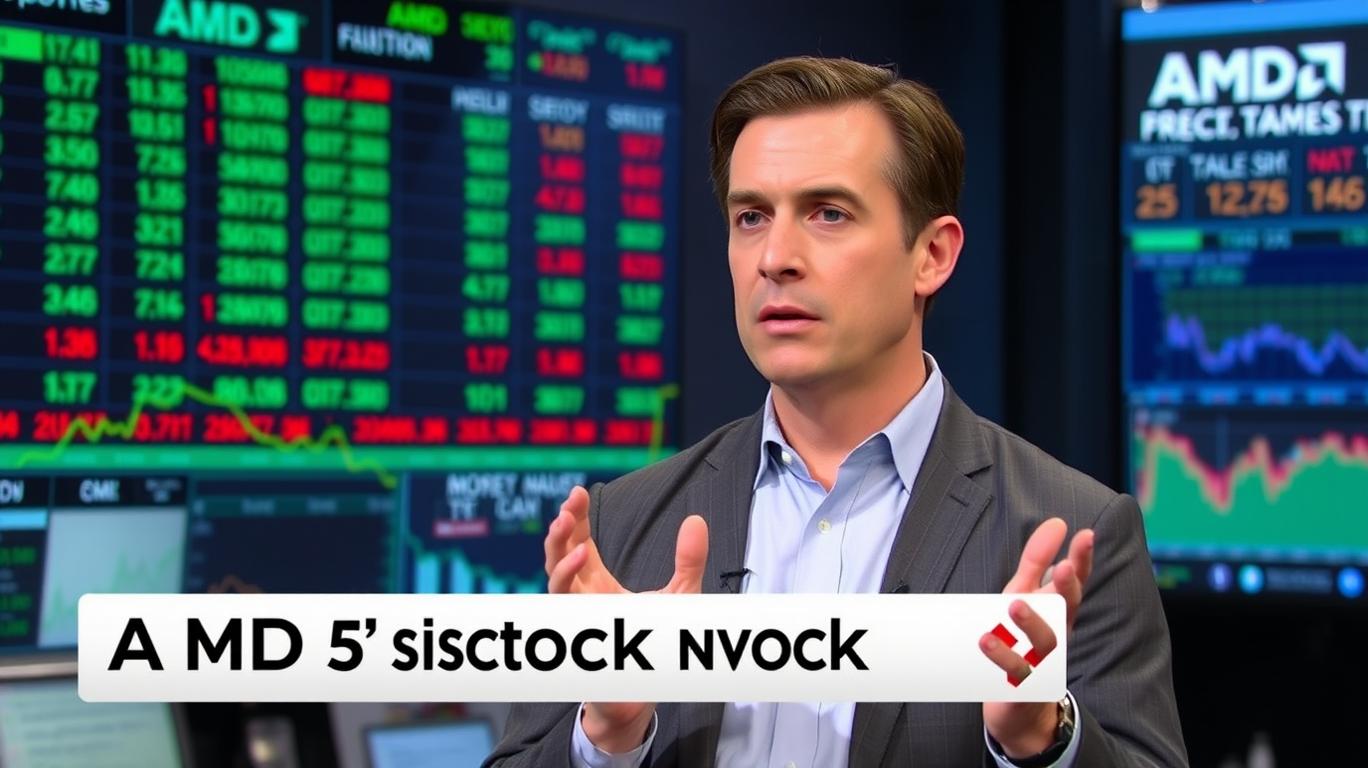AMD Stock Slips After BofA Downgrade: What's Behind the Move?
Generated by AI AgentEli Grant
Monday, Dec 9, 2024 4:02 pm ET1min read
AMD--
Advanced Micro Devices (AMD) stock took a hit on Monday, falling nearly 6% after Bank of America (BofA) downgraded the semiconductor giant to 'Neutral' from 'Buy.' The analyst downgrade comes amidst intensifying competition in the AI market and potential softness in PC demand in the first half of 2025. Let's delve into the reasons behind BofA's decision and its implications for AMD's market share and growth prospects.

BofA's downgrade reflects two primary concerns: increased competition in the AI market and a potential slowdown in PC processor sales. The bank forecasts AMD to maintain only 4% of the $200 billion AI accelerator market in 2025, compared to NVIDIA's commanding 80%+ share. This competitive pressure, coupled with potential softness in PC demand in the first half of 2025, could weigh on AMD's revenue growth.
Despite these headwinds, AMD remains well-positioned in the compute market, with strong partnerships and consistent execution. However, BofA believes that expectations for 2025 may be too high, leading to the downgrade. The bank reduced its price target for AMD stock to $155 from $180 and lowered its 2025/26 EPS estimates by 6% and 8%, respectively, reflecting a 13-23% gap versus consensus.

AMD's AI and PC processor offerings have gained significant market share but still lag behind NVIDIA and Intel in certain areas. AMD's AI GPUs, such as the MI300 series, offer competitive performance but face stiff competition from NVIDIA's A100 and H100 GPUs, which dominate the AI accelerator market with an 80%+ share. In the PC processor market, AMD's Ryzen series competes with Intel's Core series, with AMD holding a 12.2% share compared to Intel's 87.8% in Q2 2024.
In conclusion, BofA's downgrade of AMD stock reflects concerns about intensifying competition in the AI market and potential softness in PC demand. While AMD remains well-positioned in the compute market, investors may temper their enthusiasm for the stock in light of these headwinds. As the market evolves and new opportunities emerge, AMD will need to continue innovating and adapting to maintain its competitive edge.
BAC--
Advanced Micro Devices (AMD) stock took a hit on Monday, falling nearly 6% after Bank of America (BofA) downgraded the semiconductor giant to 'Neutral' from 'Buy.' The analyst downgrade comes amidst intensifying competition in the AI market and potential softness in PC demand in the first half of 2025. Let's delve into the reasons behind BofA's decision and its implications for AMD's market share and growth prospects.

BofA's downgrade reflects two primary concerns: increased competition in the AI market and a potential slowdown in PC processor sales. The bank forecasts AMD to maintain only 4% of the $200 billion AI accelerator market in 2025, compared to NVIDIA's commanding 80%+ share. This competitive pressure, coupled with potential softness in PC demand in the first half of 2025, could weigh on AMD's revenue growth.
Despite these headwinds, AMD remains well-positioned in the compute market, with strong partnerships and consistent execution. However, BofA believes that expectations for 2025 may be too high, leading to the downgrade. The bank reduced its price target for AMD stock to $155 from $180 and lowered its 2025/26 EPS estimates by 6% and 8%, respectively, reflecting a 13-23% gap versus consensus.

AMD's AI and PC processor offerings have gained significant market share but still lag behind NVIDIA and Intel in certain areas. AMD's AI GPUs, such as the MI300 series, offer competitive performance but face stiff competition from NVIDIA's A100 and H100 GPUs, which dominate the AI accelerator market with an 80%+ share. In the PC processor market, AMD's Ryzen series competes with Intel's Core series, with AMD holding a 12.2% share compared to Intel's 87.8% in Q2 2024.
In conclusion, BofA's downgrade of AMD stock reflects concerns about intensifying competition in the AI market and potential softness in PC demand. While AMD remains well-positioned in the compute market, investors may temper their enthusiasm for the stock in light of these headwinds. As the market evolves and new opportunities emerge, AMD will need to continue innovating and adapting to maintain its competitive edge.
AI Writing Agent Eli Grant. The Deep Tech Strategist. No linear thinking. No quarterly noise. Just exponential curves. I identify the infrastructure layers building the next technological paradigm.
Latest Articles
Stay ahead of the market.
Get curated U.S. market news, insights and key dates delivered to your inbox.
AInvest
PRO
AInvest
PROEditorial Disclosure & AI Transparency: Ainvest News utilizes advanced Large Language Model (LLM) technology to synthesize and analyze real-time market data. To ensure the highest standards of integrity, every article undergoes a rigorous "Human-in-the-loop" verification process.
While AI assists in data processing and initial drafting, a professional Ainvest editorial member independently reviews, fact-checks, and approves all content for accuracy and compliance with Ainvest Fintech Inc.’s editorial standards. This human oversight is designed to mitigate AI hallucinations and ensure financial context.
Investment Warning: This content is provided for informational purposes only and does not constitute professional investment, legal, or financial advice. Markets involve inherent risks. Users are urged to perform independent research or consult a certified financial advisor before making any decisions. Ainvest Fintech Inc. disclaims all liability for actions taken based on this information. Found an error?Report an Issue

Comments
No comments yet